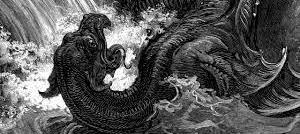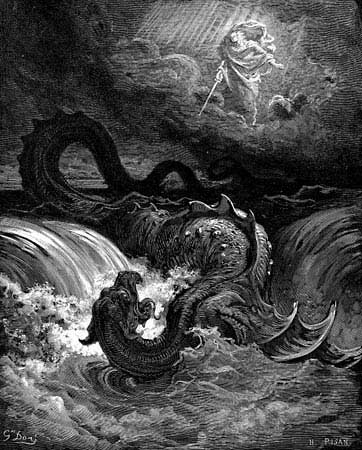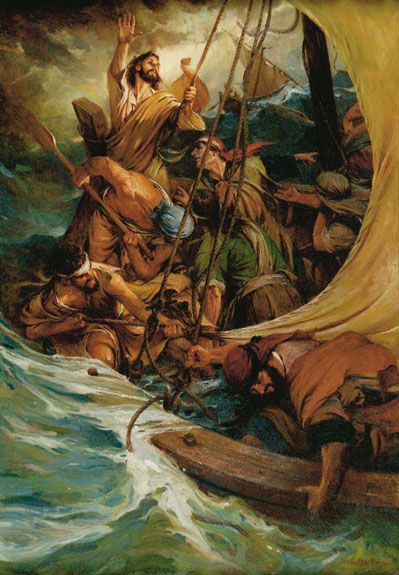
John 20:11-18 (Matins)
1 Corinthians 1:10-18
Matthew 14:22-34
Primordial Chaos
But the boat was now in the middle of the sea, tossed by the waves, for the wind was contrary.
In the Name of the Father and of the Son and of the Holy Ghost. Amen.
Last Sunday we beheld the Lord Jesus performing one of His signature acts:
the feeding of the people Israel in the wilderness with a kind of manna:
|
"so they all ate and were filled" (Mt 14:20)
(Mt 14:20)
|
But in a sense the tens of thousands in our Gospel narrative,
and,
indeed,
billions today
have already been fed.
Providence always already has supplied their needs.
For the earth is abundant with grain of many varieties,
and
the sea is teeming with many varieties of fish.
(And I add in plaintive tones that the world
does not face a crisis of starving people
but that starving people face the crisis of "haves"
and
"have-nots".
The problem is greed.)
The subject here is not Providence supplying our needs.
He has already done that.
The subject is wresting order out of chaos.
This goes to the essence of Who God is.
In our Gospel lesson, the Disciples ask Jesus
walking through the mists upon the sea
Who He is,
and He replies, "I Am"
(Mt 14:27, Holy Apostles Convent translation).
Jesus is the Logos, Who created the world,
Who hovered over the increate void
and
brought about an order of such beauty and intricacy
that we are in awe.
He does this spiritually as well.
Have any of you edged near to sin
sufficiently far to understand that it is a world of chaos.
The telós of sin is disease,
incurable disease,
and
then death,
and
then eternal death.
We read that "the wages of sin are death,"
and
we experience this through the prism of the our own lives.
On the one hand,
Paradise and its perfect orderliness
and
on the other
its opposite
Pandemonium,
literally all demons.
What our God does quintessentially is to wrest order out of chaos.
We too much wrest order out of mild chaos.
The grain must be harvested,
milled,
worked in to a dough,
and
baked.
The fish, too, must be caught,
gathered into a net,
brought ashore,
and
sorted.
The example of fishing in boats is fraught with danger,
for it draws one perilously near to that symbol of furious chaos:
the sea.
To the ancient world no power on earth
was as changeable, as overpowering, and as treacherous as the sea.
Notice that the Gospels include no instances of fishing expeditions
in the Mediterranean.
Such an act would have been foolhardy-unto-suicidal.
If you've ever ventured into the ocean in a small boat,
you can feel the awesome power even through the boards of the boat's hull.
When we see the Jesus' disciples fishing,
it is always
upon a fresh water lake,
the Lake Genessaret, which is also called the Sea of Galilee.
Even there they face wrack and ruin.
And when God chose to end His Creation, He chose the sea
to erase His seemingly indomitable work,
which no man might resist.
Perhaps it is more appropriate to say that God
removed His shepherd's crook which had protected us,
and let in the forces of chaos,
forces that had been there all along.

In the human imagination,
the sea has always been a dark, boiling cauldron of ungovernable chaos.
It is YHWH alone, Who might subdue Leviathan, the personification of sea-chaos.
Only YHWH might confront Rahab the sea-monster and rule her.
The "cohorts of Rahab lie prostrate at YHWH's feet,"
writes
Job (9:13).
And this primordial battle echoes through the Psalter:
The waters stood above the mountains.
At Your rebuke they fled;
(Ps 104:6-7)
You rule the raging of the sea;
When its waves rise, You still them.
You have broken Rahab in pieces,
as one who is slain;
(Psalm 89:9-10)
The waters saw You, O God;
The waters saw You, they were afraid;
The depths also trembled.
(Ps 77:16)
You divided the sea by Your strength;
You broke the heads of the sea monsters in the waters.
You broke the heads of Leviathan in pieces,
And gave him as food to the people inhabiting the wilderness.
(Ps 74:13-14)
|
"And gave him as food to the people."
YHWH's victory over sea monster
goes beyond mastery.
YWHW has wrested order from chaos.
And this act is not only life-giving;
it is the primordial gift of life:
The earth was without form, and void; and darkness was on the face of the deep.
And the Spirit of God was hovering over the face of the waters.
Then God said, "Let there be light"; and there was light.
(Gen 1:2-3)
|
Where the dark void had boiled in meaningless churnings,
a universe of life has appeared:
orderly,
fertile,
filled with light,
and
good (Gen 1:4).
The overall picture is of a harmonious and peaceable kingdom
which has
pushed out chaos
and
bounded it off with impassable bulwarks.
Chaos itself has not been vanquished.
It does not go away.
It has been governed.
It is better to say that God has bounded off a Heaven and Earth
midst increate matter.
He has bounded off all that is good and life-giving
that His human creatures might dwell in safety.
And we must never forget that once you venture from earth
to outer space,
you enter a domain of
lifeless stones spinning in a void.
Chaos
—
disorder,
madness,
destruction
—
remain
unabated.
We might say that chaos is everywhere ....
everywhere but here, within God's good borders.
The Earth He has made, which is the wonder of the cosmos.
As far back as the seventeenth century,
the presence of pervasive chaos was recognized as
being basic to our physics.
Sir Isaac Newton
reserved a most important place for it in his
Laws of Thermodynamics
(Philosophiae Naturalis Principia Mathematica, 1687)
declaring
that every random event contributes to the disorder of the universe.
That is,
the universe irretrievably tends toward its beginning in chaos.
Chaos, we might say, goes to the inmost nature of our universe,
its
prima materia
("first matter").
Present theory holds that
the universe had been packed into a single atom
and
in 10-33 seconds
was unpacked releasing a cosmic burst of light,
which God alone might manage,
pure light out of absolute darkness,
utter order out of utter disorder.
I share that when I was at Bell Labs,
my boss' boss held the Nobel Prize in Physics.
He told me that he read the opening verses of Genesis
as "a precise, though poetic, expression of the Big Bang Theory."
We ourselves
experience
a world always unraveling back to its chaotic origins:
wood rots,
steel rusts,
stones scatter randomly in a landslide.
It is no exaggeration to say that our principle challenge
here on the Hermitage Farm is fighting chaos.
Milton captured the spiritual dimension of Chaos
in Paradise Lost.
High above all, above the most High Heaven, is God.
Beneath all,
in depths of deepest darkness presides Satan in his Hell.
In between is Chaos
—
"eternal anarchy,"
"a wild abyss,"
where confusion reigns:
The secrets of the hoary Deep — a dark
Illimitable ocean, without bound,
Without dimension; where length, breadth, and height,
And time, and place, are lost; where eldest Night
And Chaos, ancestors of Nature, hold
Eternal anarchy, amidst the noise
Of endless wars, and by confusion stand.
(Paradise Lost II, 891-896)
|
Beneath all this
is the domain of all demons,
whose name in Greek is
πανδαιμονιον
/
pan-demonium,
our modern word for chaos.

Throughout the Gospels we see pandemonium with its restless opportunism everywhere.
Demons, even by the legion, inhabit and dominate humans who have let their guard down.
Their destructive power
drives a frenzied herd of swine to leap into the unruly sea,
the fickle sea which might shatter a fishing boat:
And suddenly a great tempest arose on the sea, so that the boat was covered
with the waves. But He was asleep. Then His disciples came to Him and awoke
Him, saying, "Lord, save us! We are perishing!"
(Mt 8:24-25)
|
Well might we call out from our chaos, "Lord, save us!"
For God alone has the power commensurate to such extremes.
Milton uses the phrase "eldest Night,"
for nothing precedes primordial chaos.
Our world is not Paradise-on-earth.
It is a life-and-death drama which discloses glimpses of mystery and the Divine.
When we forsake God,
when we have departed from Him,
we also forsake His order and goodness and protection.
The flood of chaos engulfs us.
It is always there, waiting for an opportunity.
In that sense,
perhaps it is more accurate to say
that in our personal chaos we are closer to Pandemonium than to Paradise,
whose demons we now see with regularity, running rampant through our culture.
These are the forerunners of the dark lord who already rules the world:
.... the prince of the power of the air, the spirit who now works
in the sons of disobedience, among whom also we all once conducted
ourselves in the lusts of our flesh, fulfilling the desires
of the flesh and of the mind, and were by nature children of wrath, ....
(Eph 2:2-3)
|
But we who have forsaken the world,
who look with alarm on our brethren horribly disfigured,
are attended by
holy messengers of light.
With Jacob we see a ladder unto Heaven.
And with the Disciples
we hear the Good Shepherd,
Who has declared,
"Ye shall see
Heaven open and the angels of God ascending and descending upon the Son of Man."
We shall have the company of angels.
We shall spend our days with messengers of light.
And we shall ascend that ladder,
for the promises of Christ are to be depended upon and trusted.
In the Name of the Father and of the Son and of the Holy Ghost. Amen.


